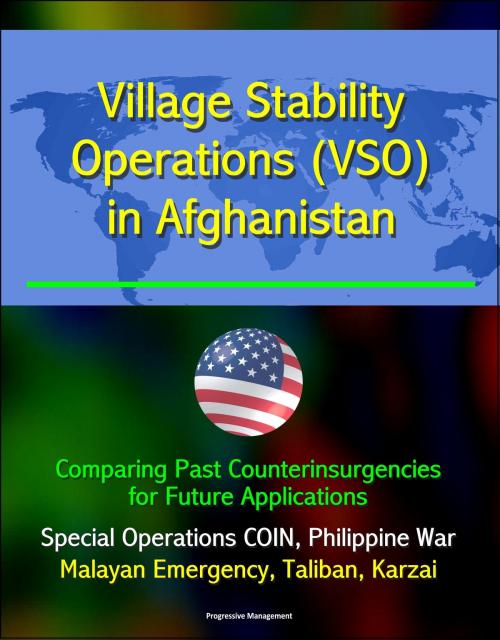Village Stability Operations (VSO) in Afghanistan: Comparing Past Counterinsurgencies for Future Applications - Special Operations COIN, Philippine War, Malayan Emergency, Taliban, Karzai
Nonfiction, History, Military, Social & Cultural Studies, Political Science| Author: | Progressive Management | ISBN: | 9781310031724 |
| Publisher: | Progressive Management | Publication: | November 24, 2014 |
| Imprint: | Smashwords Edition | Language: | English |
| Author: | Progressive Management |
| ISBN: | 9781310031724 |
| Publisher: | Progressive Management |
| Publication: | November 24, 2014 |
| Imprint: | Smashwords Edition |
| Language: | English |
Village Stability Operations (VSO) has been the cornerstone counterinsurgency strategy and primary mission for U.S. Special Operations Forces in Afghanistan since 2010. The VSO program has drawn criticism for human rights violations committed by the Afghan Local Police and poor reception by much of the Afghan population. Despite setbacks in the VSO, areas in rural Afghanistan, once safe havens for insurgents, have experienced increased security and stability.
This thesis compares the Philippines War (1899-1902) and the Malayan Emergency (1948-1960) to VSO in Afghanistan along the areas of security, governance, and development. The comparison studies two considerably successful counterinsurgencies to VSO in order to examine the practices, and procedures to determine why and how the case studies were successful.
As the U.S. draws down military forces from Afghanistan in 2014, it is imperative to analyze the effectiveness of the VSO. Lessons from the VSO model can be directly applied by USSOF and conventional forces to other operations to include nation assistance, security force assistance, foreign internal defense, and counterterrorism. Given the current and future operational environments, fiscal constraints, and public opposition of mass deployments, the VSO model is relevant to counter complex problems throughout the world.
CHAPTER 1 * INTRODUCTION * Village Stability Operations in Afghanistan * Research Questions * Assumptions * Limitations * Scope and Delimitations * Significance of Study * Summary and Conclusions * CHAPTER 2 * LITERATURE REVIEW * CHAPTER 3 * RESEARCH METHODOLOGY * CHAPTER 4 * ANALYSIS * Purpose and Organization * The Philippine War, 1899-1902 * The Road to Insurrection * The Philippine War: The Cause of the Insurgency * Security, Governance, and Development * Why was the Philippines War a Successful Counterinsurgency? * The Malayan Emergency, 1947-1960 * The Birth of Insurgency in Malaysia * Security, Governance, and Development: The Briggs Plan * The Communists Lose Initiative * Why was the Malaya Emergency a Successful Counterinsurgency? * Afghanistan, 2001 to Present * The Birth of the Taliban * Village Stability Operations (VSO) * Evolution of VSO * Security, Governance, and Development * Comparing the Three Counterinsurgencies * Conclusion * CHAPTER 5 * CONCLUSIONS AND RECOMMENDATIONS * Introduction * Has the Village Stability Operations methodology been successful? * What changes are necessary to make VSO more successful in Afghanistan? * ALP Recruitment and Vetting * Abuse of Power * Corruption * Messaging * Literacy * Logistics and Resources * The 2014 Transition * Can VSO be applied to other operational environments? * Interpretation of Findings * The Unexpected Findings * Recommendations * Considerations for Further Study * Unanswered Questions * Different Approaches * Summary and Conclusion * GLOSSARY * BIBLIOGRAPHY
Village Stability Operations (VSO) has been the cornerstone counterinsurgency strategy and primary mission for U.S. Special Operations Forces in Afghanistan since 2010. The VSO program has drawn criticism for human rights violations committed by the Afghan Local Police and poor reception by much of the Afghan population. Despite setbacks in the VSO, areas in rural Afghanistan, once safe havens for insurgents, have experienced increased security and stability.
This thesis compares the Philippines War (1899-1902) and the Malayan Emergency (1948-1960) to VSO in Afghanistan along the areas of security, governance, and development. The comparison studies two considerably successful counterinsurgencies to VSO in order to examine the practices, and procedures to determine why and how the case studies were successful.
As the U.S. draws down military forces from Afghanistan in 2014, it is imperative to analyze the effectiveness of the VSO. Lessons from the VSO model can be directly applied by USSOF and conventional forces to other operations to include nation assistance, security force assistance, foreign internal defense, and counterterrorism. Given the current and future operational environments, fiscal constraints, and public opposition of mass deployments, the VSO model is relevant to counter complex problems throughout the world.
CHAPTER 1 * INTRODUCTION * Village Stability Operations in Afghanistan * Research Questions * Assumptions * Limitations * Scope and Delimitations * Significance of Study * Summary and Conclusions * CHAPTER 2 * LITERATURE REVIEW * CHAPTER 3 * RESEARCH METHODOLOGY * CHAPTER 4 * ANALYSIS * Purpose and Organization * The Philippine War, 1899-1902 * The Road to Insurrection * The Philippine War: The Cause of the Insurgency * Security, Governance, and Development * Why was the Philippines War a Successful Counterinsurgency? * The Malayan Emergency, 1947-1960 * The Birth of Insurgency in Malaysia * Security, Governance, and Development: The Briggs Plan * The Communists Lose Initiative * Why was the Malaya Emergency a Successful Counterinsurgency? * Afghanistan, 2001 to Present * The Birth of the Taliban * Village Stability Operations (VSO) * Evolution of VSO * Security, Governance, and Development * Comparing the Three Counterinsurgencies * Conclusion * CHAPTER 5 * CONCLUSIONS AND RECOMMENDATIONS * Introduction * Has the Village Stability Operations methodology been successful? * What changes are necessary to make VSO more successful in Afghanistan? * ALP Recruitment and Vetting * Abuse of Power * Corruption * Messaging * Literacy * Logistics and Resources * The 2014 Transition * Can VSO be applied to other operational environments? * Interpretation of Findings * The Unexpected Findings * Recommendations * Considerations for Further Study * Unanswered Questions * Different Approaches * Summary and Conclusion * GLOSSARY * BIBLIOGRAPHY















